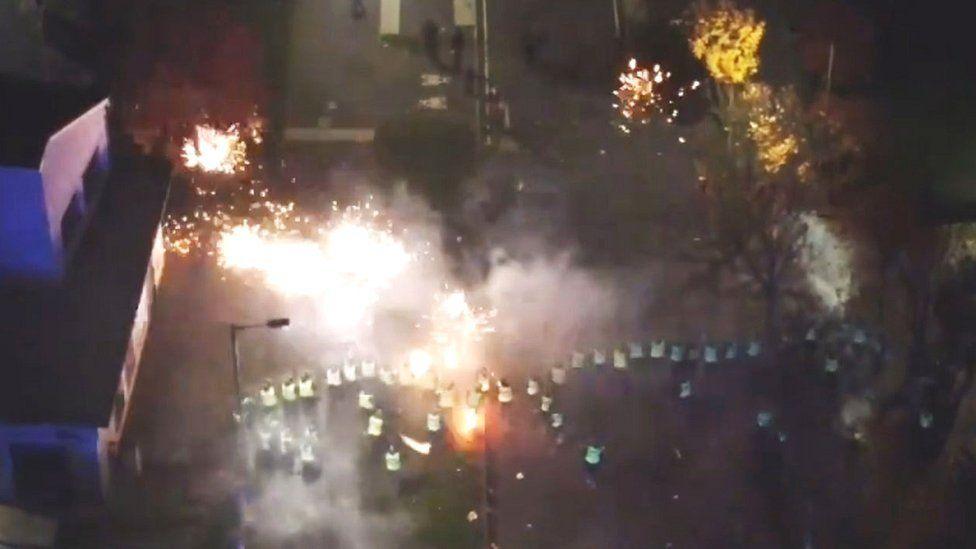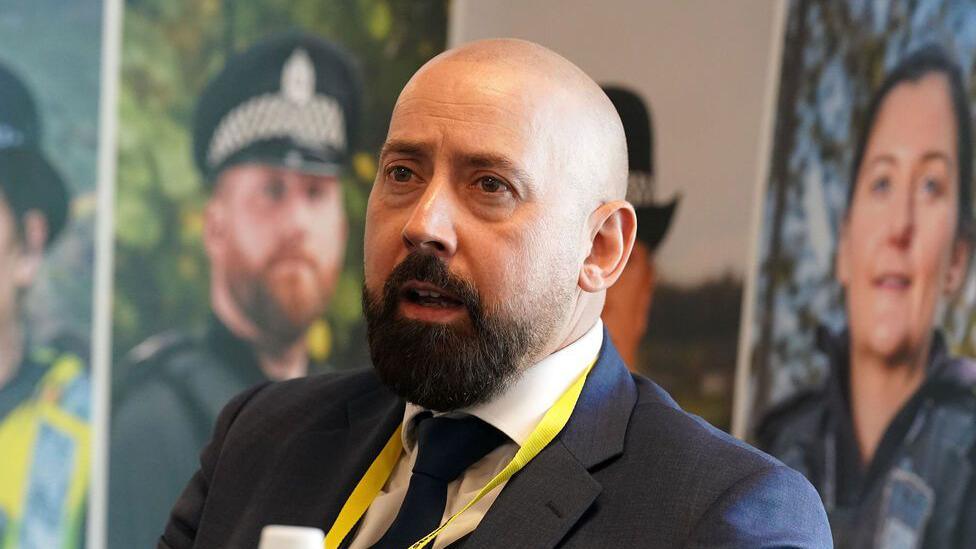Police officers plan legal claim after Bonfire Night attack

- Published
Police Scotland is facing the threat of legal action from officers injured during Bonfire Night in Edinburgh last year.
Chaos broke out in the Niddrie area of the city after a group of 50 youths threw fireworks and petrol bombs at riot police.
The Scottish Police Federation (SPF), which represents rank and file officers, said around 70 officers were injured.
It said the vast majority of the injuries were minor but 21 of the officers still suffer hearing problems and a further officer is still injured after being hit by a firework.
Video footage from the night showed officers in riot gear standing in a line while youths threw explosives at their feet.
Officers suffered minor injuries while responding to disturbances in Glasgow, Edinburgh and Dundee, and incidents were also reported in other parts of Scotland.
And the Scottish Fire and Rescue Service (SFRS) said nine crews were attacked during an eight-hour period across the country.
At least three arrests were made in connection with the disturbances in the days that followed.
David Kennedy, general secretary of the SPF, said the damage could have been prevented if officers had been supplied with the appropriate protective gear.
He told BBC Radio's Good Morning Scotland programme that the force had 10,000 sets of sound suppressors at the time, but had not given them out yet.
A Police Scotland spokesperson confirmed hearing issues had been reported, but the force was unaware of any legal proceedings at this stage.
Police petrol-bombed in Bonfire Night disorder
- Published6 November 2023
Bonfire Night violence was organised, say police
- Published6 November 2023
Arrests made over Bonfire Night disorder
- Published7 November 2023
Mr Kennedy called the violent disorder in Niddrie an "unprecedented attack".
“The officers in Niddrie were exposed to a constant barrage of fireworks, petrol bombs and other missiles for around three hours on that evening," he said.
He told the programme that most officers involved in the legal action now suffered from tinnitus, which could become a permanent problem.
"This is a problem that could’ve been resolved if they had been given the appropriate earpieces to use with their airwaves to hear the radio," he said.
“Tinnitus is debilitating and for some it could become worse.
"Some officers could actually lose their hearing as it gets worse over the years, so it could end some of those officers' careers eventually."

David Kennedy said the officers were considering a legal claim against the force
Mr Kennedy said the SPF planned to gather information before taking legal and medical advice for a personal injury claim against Police Scotland.
"But it’s looking like a legal claim will be forthcoming," he added.
"On health and safety, we have to make sure it doesn’t happen again and officers have the appropriate equipment and proper hearing aids that will allow them to do their job safely."
Assistant Chief Constable Tim Mairs is the gold commander for Operation Moonbeam, which was launched in 2018 to deal with the high levels of public disorder around Bonfire Night each year.
He told BBC Scotland News the force was committed to protecting officers and staff from injury and harm while on duty.
He said: “Prior to Operation Moonbeam 2023, Police Scotland purchased new noise-cancelling ear defenders, which are designed to protect our officers’ hearing without compromising their ability to hear routine sounds or conversations in a noisy environment.
“These had not been public order tested in time for use during the operation, but have since been provided to officers deployed for policing the Hogmanay street party, sporting events and other major operations."
He said 34 officers reported hearing issues after Bonfire Night and a full rollout of new noise defenders was under way for all officers.
Firework control zones
The Scottish government gave local authorities new powers to designate firework control zones in 2022.
It is a criminal offence for a member of the public to use a firework within a firework control zone.
Edinburgh and Glasgow City Councils are both seeking to implement the controls before Bonfire Night this year to prevent similar disorder from happening again.
The Fireworks and Pyrotechnic Articles (Scotland) Bill, external created a licensing scheme and limits the number of days when fireworks can be sold.
They can now only by bought and used by members of the public at certain times of the year, including Guy Fawkes Day, Hogmanay, Chinese New Year and Diwali.
It is also now an offence to give fireworks to, or buy them for, a child. Anyone found guilty of doing this will be subject to a fine of £5,000, a six-month prison term, or both.